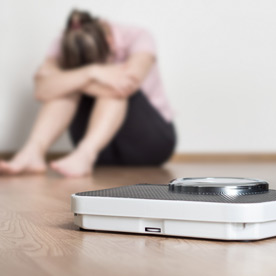
Many of us find gaining weight easier than losing it. While lifestyle is partly to blame here – eating too much and exercising too little plays a role – there are many causes of weight gain. And for some women with PCOS, the silent culprit comes down to hormones.
Is my weight gain to do with PCOS?
PCOS is a complex hormone disorder characterised by high androgens (‘male’ hormones) and insulin resistance. These effects can lead to many bothersome symptoms, such as irregular periods, excess hair growth, and acne.
One of the most challenging complications can be weight gain, so if you’re having difficulties with weight management PCOS could be one of many reasons behind it.
 So, how can you tell if it’s PCOS or not? If you have symptoms of PCOS, they’ll often appear during your late teens or early 20s. You may experience the following physical and emotional changes although it’s worth noting not all women with PCOS will present in these ways.
So, how can you tell if it’s PCOS or not? If you have symptoms of PCOS, they’ll often appear during your late teens or early 20s. You may experience the following physical and emotional changes although it’s worth noting not all women with PCOS will present in these ways.
-
Irregular periods, or no periods
-
Fertility problems (finding it difficult to get pregnant)
-
Excess facial or body hair (face, chest, back, stomach and/or buttocks)
-
Sleep apnoea (interrupted breathing during sleep)
If you have typical PCOS symptoms and weight gain, you may want to chat with your GP, who can run hormone tests and an ultra-sound scan. They may also decide to screen you for diabetes, high blood pressure and high cholesterol – all of which are long-term effects associated with PCOS.
How PCOS affects weight
Unfortunately, PCOS weight gain is common. This is most often down to insulin resistance, which is widely experienced in the PCOS community (3)
Insulin resistance occurs when the body can’t transfer glucose from the bloodstream into the cells for energy. As a result, the pancreas releases more insulin to maintain a normal blood sugar level. Over time, this leads to a build-up of blood sugar, which can cause weight gain and other bothersome symptoms.
To add fuel to the fire, PCOS weight gain can exacerbate other aspects of the condition, as it causes the body to produce even more insulin.
PCOS extends beyond the physical, too. Distressing symptoms can lead to poorer mental health outcomes. And, sometimes people with mental health challenges may turn to food for comfort
Other possible causes of weight gain in women
Women may gain weight for a number of reasons other than polycystic ovary syndrome, including those related to emotional health, lifestyle, medical conditions, and hormonal imbalances.
Poor mental health
Mental health challenges, like anxiety and depression – and their impact on confidence and self-esteem – are often behind weight gain.
Living with a mood disorder can cause some individuals to overeat and use food as a coping mechanism. Equally, women who are depressed may lack the motivation to exercise, which can set the stage for weight problems.
Studies also note a complex, bi-directional relationship between mood disorders and gaining unwanted weight. A 2010 systematic review reported obese individuals had a 55% increased risk of developing depression, while people experiencing depression had a 58% increased risk of becoming obese (1).
On top of that, women with anxiety and depression are more likely to have poorer sleep quality, which, again, can lead to weight gain. A lack of sleep causes hormone imbalances, slowing metabolism and increasing appetite.
The medication used to manage mental health conditions can cause lethargy and increase hunger, too, both of which are known to contribute to weight gain.
Lack of sleep
Sleep is often overlooked in the weight gain conversation. But it’s essential to keep weight within a healthy range.
Inadequate rest is linked to lower levels of the hormone leptin, which leads to feeling less full, and higher levels of the hormone ghrelin, which increases appetite (2). These imbalances create the perfect storm for unhealthy food choices and possible weight gain, especially if sleep deprivation is chronic.
People also feel more energised, alert, and happier after a night of good sleep. This may result in more exercise and socialising, both of which mean less sitting and, potentially, less weight gain.
You can learn more about supporting your sleep hygiene on our dedicated Sleep Health Hub.
Underactive thyroid
The thyroid gland releases hormones that regulate your metabolism. So, when your thyroid makes less of its hormones – as it does when you have an underactive thyroid (hypothyroidism) – your metabolism slows downs. This means you won’t be able to burn off calories as quickly and you’ll be more likely to gain weight.
If you suspect you have an underactive thyroid, you may also experience tiredness, dry skin and hair, sensitivity to the cold, and aching muscles. It may be worth having a chat with your GP to get a diagnosis.
Insulin treatment
Weight gain is a common side effect of taking insulin to balance blood sugar levels in diabetes. This can be hugely frustrating and challenging because maintaining a healthy weight is important for diabetes management.
Steroid treatment
Some steroid medications can increase appetite, lead to fluid retention, and change how the body deposits fat, which can contribute to weight gain.
Generally speaking, the higher the dose of steroid and the longer you’re on it, the more likely you are to gain weight.
Find out more
Diet and lifestyle factors aren’t the only explanations for weight gain. If you suspect you have PCOS, your hormones might be playing a role, too. Fortunately, there are many ways to lose weight in a healthy, sustainable way if this is the case. Our guide on PCOS weight loss is a great place to start.
If you found this look into PCOS weight gain helpful, you can find similar guidance on our dedicated PCOS health hub. Alternatively, please get in touch with our team of expert Nutrition Advisors, who are on hand to provide free, confidential advice.
References:
-
Luppino FS, de Wit LM, Bouvy PF, et al. (2010) Overweight, Obesity, and Depression: A Systematic Review and Meta-analysis of Longitudinal Studies. Arch Gen Psychiatry. 67(3):220-229.
-
Ogilvie RP, Patel SR. (2017) The epidemiology of sleep and obesity. Sleep Health. 3(5):383-388.
-
Marshall JC, Dunaif A. (2012) Should all women with PCOS be treated for insulin resistance? Fertil Steril. 97(1):18-22.
Related Posts?
Disclaimer: The information presented by Nature's Best is for informational purposes only. It is based on scientific studies (human, animal, or in vitro), clinical experience, or traditional usage as cited in each article. The results reported may not necessarily occur in all individuals. Self-treatment is not recommended for life-threatening conditions that require medical treatment under a doctor's care. For many of the conditions discussed, treatment with prescription or over the counter medication is also available. Consult your doctor, practitioner, and/or pharmacist for any health problem and before using any supplements or before making any changes in prescribed medications.

Olivia
Olivia Salter has always been an avid health nut. After graduating from the University of Bristol, she began working for a nutritional consultancy where she discovered her passion for all things wellness-related. There, she executed much of the company’s content marketing strategy and found her niche in health writing, publishing articles in Women’s Health, Mind Body Green, Thrive and Psychologies.
View More



